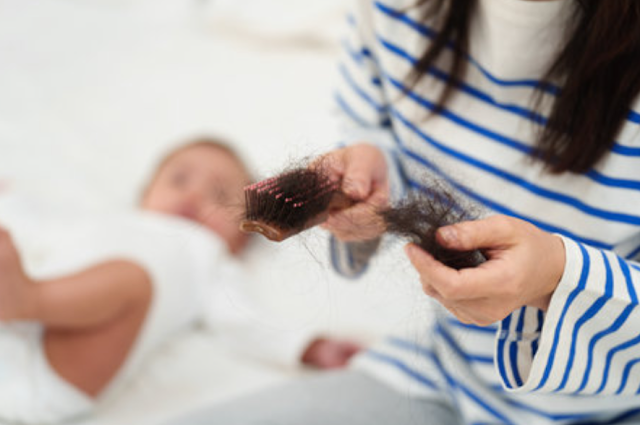Hair Loss in Women After Pregnancy: Finding a Hair Loss Solution
Hair Loss in Women After Pregnancy: Finding a Hair Loss Solution
Abstract: Hair loss, medically known as postpartum alopecia, is a common phenomenon that affects many women after pregnancy. This article delves into the causes, mechanisms, and psychological impacts of postpartum hair loss. It explores various treatment options and preventive measures that can help women navigate this challenging period and regain their confidence. By understanding the science behind postpartum hair loss and exploring the available solutions, women can make informed decisions about managing this temporary condition.
Introduction: Pregnancy is a transformative experience in a woman's life, both physically and emotionally. While the birth of a child brings immense joy, it can also bring about several changes in the mother's body. One such change that many women experience is postpartum hair loss. Also known as postpartum alopecia, this phenomenon can be distressing for new mothers as they grapple with the emotional and physical challenges of motherhood. This article aims to shed light on the causes of postpartum hair loss, its mechanisms, and the range of solutions available to address it.
Understanding Postpartum Hair Loss: Postpartum hair loss typically occurs within a few months after giving birth. During pregnancy, elevated hormone levels, particularly estrogen, can prolong the hair's growth phase (anagen phase), resulting in thicker and more luxurious hair. However, after childbirth, hormone levels drop significantly, causing a larger percentage of hair follicles to enter the resting phase (telogen phase). This leads to the shedding of hair, resulting in noticeable hair loss.
Causes and Mechanisms:
- Hormonal Fluctuations: The primary driver of postpartum hair loss is the dramatic change in hormone levels that occurs after delivery. Estrogen, which contributes to hair retention during pregnancy, decreases significantly after childbirth. This shift triggers the hair follicles to enter the shedding phase.
- Telogen Effluvium: Postpartum hair loss is a classic example of telogen effluvium, a temporary hair loss condition. The body's stress response during childbirth can also play a role in triggering hair follicles to shift from the growing phase to the resting phase.
- Nutritional Deficiencies: Pregnancy can deplete a woman's nutrient reserves, and deficiencies in essential vitamins and minerals like iron, zinc, biotin, and vitamin D can contribute to hair loss. These deficiencies may persist after childbirth and contribute to postpartum alopecia.
Psychological Impact: The emotional toll of postpartum hair loss should not be underestimated. Hair plays a significant role in one's appearance and self-esteem, and the sudden loss of hair can lead to feelings of insecurity, anxiety, and even depression. New mothers are already dealing with numerous challenges, and hair loss can exacerbate their emotional struggles.
Treatment Options:
- Topical Treatments: Minoxidil is an FDA-approved topical solution that can stimulate hair regrowth. It is available over the counter and has shown effectiveness in treating postpartum hair loss.
- Nutritional Supplements: Supplements containing biotin, iron, zinc, and other essential nutrients can address potential deficiencies and promote healthy hair growth. Consultation with a healthcare provider is recommended before starting any supplement regimen.
- Hormone Therapy: In some cases, hormone therapy may be prescribed to stabilize hormone levels and mitigate postpartum hair loss. However, this option requires careful consideration and medical supervision.
- Lifestyle Modifications: Adopting a balanced diet, managing stress through relaxation techniques, and getting regular exercise can contribute to overall well-being and indirectly support hair health.
Preventive Measures:
- Prenatal Care: Ensuring optimal nutrition and addressing any nutrient deficiencies during pregnancy can set the foundation for healthier hair postpartum.
- Gentle Hair Care: Avoiding harsh hair treatments, tight hairstyles, and excessive heat styling can minimize hair damage and prevent further hair loss.
- Stress Management: Practicing stress-reduction techniques such as yoga, meditation, and deep breathing can help prevent excessive shedding triggered by stress.
- Gradual Weight Loss: If weight loss is desired after childbirth, gradual and sustainable approaches are recommended, as rapid weight loss can contribute to hair loss.
Psychosocial Support: Recognizing the psychological impact of postpartum hair loss, it's crucial for healthcare professionals, family members, and partners to offer emotional support to new mothers. Encouragement, understanding, and reassurance can go a long way in helping women cope with the challenges of this period.
Conclusion: Postpartum hair loss is a temporary condition that many women experience after childbirth due to hormonal fluctuations, stress, and nutritional deficiencies. While it can be emotionally distressing, understanding the underlying causes and available solutions empowers women to make informed decisions about managing this phase. By seeking medical advice, adopting healthy hair care practices, and addressing nutritional needs, women can navigate postpartum hair loss with confidence and focus on the joys of motherhood. Additionally, raising awareness about this common occurrence can help normalize the experience and provide much-needed support to new mothers during this transformative journey

















No comments